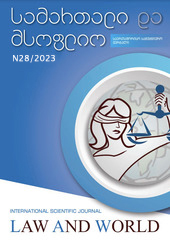მოსალოდნელი ზარალის ანაზღაურების უზრუნველყოფის პრობლემა, როგორც სარჩელის უზრუნველყოფის საპირწონე ინსტრუმენტი 
##plugins.themes.bootstrap3.article.main##
ანოტაცია
დამდგარი ზიანის ანაზღაურება არ არის დამოკიდებული მის წინასწარ უზრუნველყოფაზე, თუმცა კანონი იძლევა მოსალოდნელი ზარალის ანაზღაურების წინასწარი უზრუნველყოფის შესაძლებლობას. მოსალოდნელი ზარალის ანაზღაურების უზრუნველყოფის ინსტიტუტი მოპასუხის უფლებების დაცვის საპროცესო გარანტიების სისტემაში წარმოადგენს ერთ-ერთ ინსტრუმენტს. დოქტრინასა და პრაქტიკაში ზოგჯერ აქცენტი გადააქვთ უკვე დამდგარ ზიანზე და, შესაბამისად, მას „გაუმართლებელი უზრუნველყოფით მიყენებული ზიანის ანაზღაურების ინსტიტუტსაც“ უწოდებენ. რეალურად კი საპროცესო კანონით განსაზღვრულია მოსალოდნელი ზარალის და არა უკვე დამდგარი ანუ დადასტურებული ზიანის უზრუნველყოფის წესი. აღნიშნული ინსტიტუტის არსისადმი არასწორ მიდგომას ზარალისა და ზიანის ცნებების აღრევაც იწვევს. მოსალოდნელი ზარალის და დამდგარი ზარალის ანაზღაურების კრიტერიუმები და წესი განსხვავებულ მიდგომას მოითხოვს. დამდგარ ან მოსალოდნელ ზიანთან მიმართებით უფრო სწორი იქნება საუბარი იყოს არა თავისთავად მარტოოდენ გაუმართლებელი უზრუნველყოფით, არამედ უსაფუძვლო სარჩელის აღძვრით მიყენებული ზიანის მოპასუხისათვის ანაზღაურებაზეც. აღნიშნულის გათვალისწინებით, მოსალოდნელი ზარალის ანაზღაურების უზრუნველყოფა უნდა მოიცავდეს არა მხოლოდ გაუმართლებელი უზრუნველყოფით, არამედ გაუმართლებელი სარჩელით მოსალოდნელი ზარალის უზრუნველყოფას. არა მარტო უსაფუძვლო უზრუნველყოფით, არამედ უსაფუძვლო სარჩელით მოპასუხეს შეიძლება წარმოეშვას სხვადასხვა ხარჯი, დაკარგოს შემოსავალი. უსაფუძვლო სარჩელის აღძვრით მიყენებული ზიანის ანაზღაურების აუცილებლობაზე ყურადღება უნდა გამახვილდეს იმდენად, რამდენადაც საკუთრივ უზრუნველყოფის ღონისძიება, ჯერ ერთი, სავარაუდო ფაქტებს ეფუძნება, მეორეც, მხოლოდ ერთ-ერთი საპროცესო მოქმედებაა მოპასუხის წინააღმდეგ მიმართულ მოქმედებებს შორის. სარჩელის უზრუნველყოფის ღონისძიებაც და ამ ღონისძიების გამოყენების შედეგად მოპასუხისთვის მოსალოდნელი ზარალის ანაზღაურების უზრუნველყოფის გარანტიაც ქმნის სამართლიანი სასამართლოს უფლებით ეფექტიანად სარგებლობის ერთ-ერთ საპროცესო გარანტიას და, შესაბამისად, წარმოადგენს ადამიანის უფლებათა ევროკონვენციის მე-6 მუხლითა და საქართველოს კონსტიტუციის 31-ე მუხლის პირველი პუნქტით დაცული სფეროს ნაწილს.
##plugins.themes.bootstrap3.article.details##
როგორ უნდა ციტირება

ეს ნამუშევარი ლიცენზირებულია Creative Commons Attribution-ShareAlike 4.0 საერთაშორისო ლიცენზიით .





